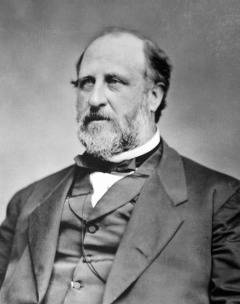| Boss Tweed  AKA William Magear Tweed, Sr. AKA William Magear Tweed, Sr.
Born: 3-Apr-1823
Birthplace: New York City
Died: 12-Apr-1878
Location of death: New York City
Cause of death: Heart Failure
Remains: Buried, Green-Wood Cemetery, Brooklyn, NY
Gender: Male
Race or Ethnicity: White
Sexual orientation: Straight
Occupation: Politician, Business, Criminal
Party Affiliation: Democratic Nationality: United States
Executive summary: Boss of Tammany Hall William Magear Tweed worked at a brush factory, and moved into management after marrying the owner's daughter. He soon became a rising star in New York City politics of the 1850s and a key player in Tammany Hall, the behind-the-scenes group that had make-or-break power over local Democratic Party nominations. By the late 1850s Tweed and his associates controlled the group, and in 1863 he was elected Chair of Tammany Hall.
With absolute power over who could be nominated as a Democratic candidate and enormous influence over appointments to office, "Boss Tweed" was himself appointed a Deputy Street Commissioner, and began putting cronies on the city payroll for doing no work. With his substantial kickbacks, Tweed bought several companies which were promptly awarded city contracts. He was elected to the State Senate in 1867, and within months had charmed and cajoled his way to similar near-absolute control over the state's capitol.
In famously barbed caricatures, Thomas Nast, cartoonist for Harper's Weekly, was one of the few prominent voices to speak against him, but Boss Tweed's dynasty was brought down from within, when other members of Tammany Hall shared evidence of Tweed's corruption with the New York Times. The Times ran a series of articles exposing Tweed in July 1871, and on 16 December 1871 he was arrested. On 19 November 1872 he was convicted on 204 of the 220 charges against him, and sentenced to thirteen years in debtors' prison.
After nineteen months in jail, he was released on appeal, then immediately re-arrested to face additional charges and civil suits. Freed from prison on an 1875 "furlough" weekend, he fled to Spain, where he was arrested as soon as his ship docked. When he was returned to prison in New York, Tweed gave a complete confession to all his crimes in hopes of leniency or a pardon, but his listed crimes were so extensive -- exceeding even what was already known, and implicating many high-ranking officials -- that the state's Attorney General refused to make a deal. He died in the federal prison in New York City.
Father: Richard Tweed (furniture chairmaker)
Mother: Eliza Magear Tweed
Wife: Mary Jane Skaden Tweed (ten children)
Daughter: Mary Amelia
Daughter: Lizzie
Son: William, Jr.
Son: Charles
Son: George
Daughter: Josephine
New York State Senate (1867-71)
New York City Official Deputy Street Commissioner (1861-70)
New York City Official Board of Supervisors, New York County (1858)
US Congressman, New York 5th (1853-55)
New York City Council Alderman (1852-53)
Fraud acquitted, retried, convicted 1873
Forgery indicted 1873
Larceny indicted 1873
Freemasonry Palestine Lodge, F. & A.M.
New York State Bar Association 1860
Oddfellows
Bankruptcy 1861
Extradited from Spain to New York (1876)
Escaped from Prison debtor's prison (4-Dec-1875)
Debtor's Prison
Heart Attack
Irish Ancestry
Tammany Hall
Risk Factors: Obesity, Diabetes
Is the subject of books:
Boss Tweed, 1927, BY: D. T. Lynch
Tiger in the Streets, 1962, BY: W. A. Bales
Boss Tweed's New York, 1965, BY: Seymour J. Mandelbaum
The Tweed Ring, 1966, BY: A. B. Callow
Tweed's New York: A Closer Look, 1977, BY: Leo Hershkowitz
Boss Tweed: The Rise and Fall of the Corrupt Pol Who Conceived the Soul of Modern New York, 2005, BY: Kenneth D. Ackerman
Requires Flash 7+ and Javascript.
Do you know something we don't?
Submit a correction or make a comment about this profile
Copyright ©2019 Soylent Communications
|